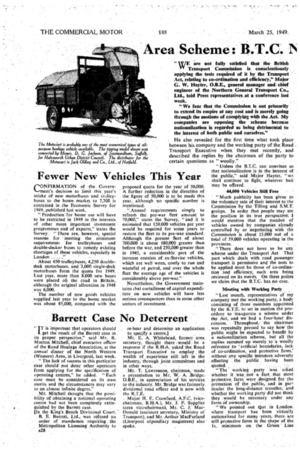Barrett Case No Deterrent
Page 4

If you've noticed an error in this article please click here to report it so we can fix it.
Iis important that operators should get the result of the Barrett case in its proper perspective," said Mr. R. Morton Mitchell; chief executive officer of the Road Haulage Association, at the annual dinner of the North Western (Western) Area, in Liverpool, last week. .
"The lack of success in this particular case should not deter other operators from applying for the specification of operating centres,", he added. " Each case' must be considered on its own merits and the circumstances may vary to an almost infinite degree."
Mr. Mitchell thought that the possibility of obtaining a notional.operating centre had not been completely extinguished by the Barrett case.
[In the King's Bench Divisional Court. B. E. Barrett, Ltd., was refused an order of mandamus requir]ng. the Metropolitan Licensing Authority to A28 re-hear and determine an application to specify a centre.] Mr. F. A. Whitehead, former area secretary, thought there would be a response if the R.H.A. asked the Road Transport Executive to employ . the wealth of experience still left in the industry, through joint committees and in other ways.
Mr.. T. Lawrenson, chairman, made a presentation. to Mr.. W. A. Bridge,. D.R.E., in appreciation of his services to the industry. Mr. Bridge was formerly divisional road officer and is now with the R.T.F.
• Major H. E. Crawfurd, A.F.C. (vicechairman, R.1-1:A.), Mr. J. F. Supplies (area vice-chairman), Mr. C. J. MacDonald (assistant secretary, Ministry of Transport), and Mr. Arthur Macfarland (Liverpool stipendiary magistrate) also spoke.


























